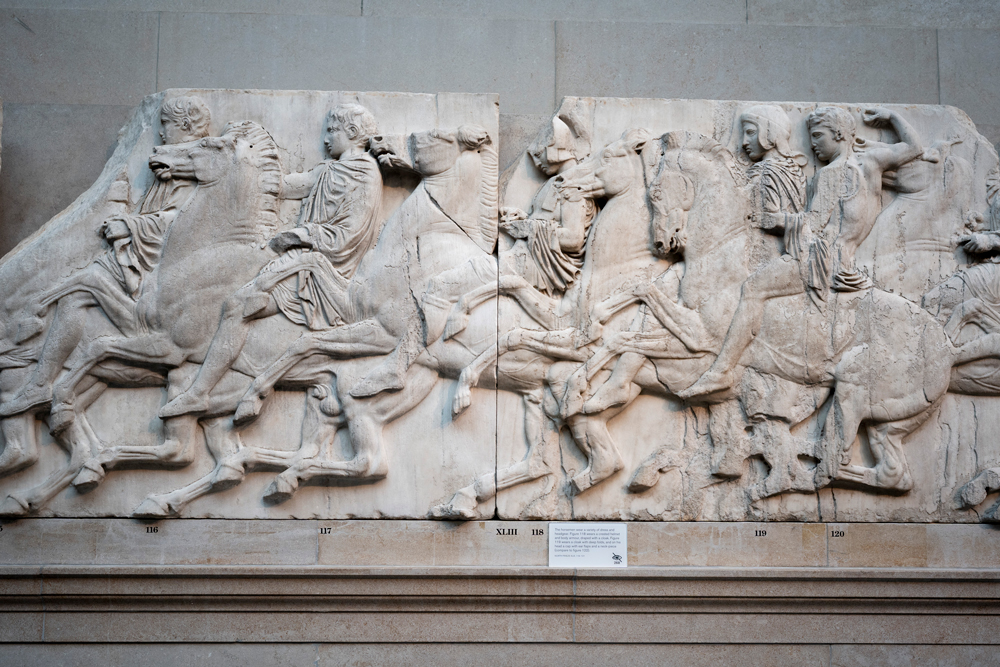The British prime minister cancelled a meeting with the Greek prime minister, who called for the return of the Parthenon marbles in an interview with the BBC last Sunday (26 November). The UK government then offered Kyriakos Mitsotakis a meeting with the deputy prime minister Oliver Dowden, an offer that was refused. On Wednesday, Sunak told British MPs that the cancellation came about when it seemed that Mitsotakis intended ‘to grandstand and relitigate issues of the past’. The chairman of the British Museum, George Osborne, has criticised Sunak for his actions. Speaking on Thursday on his podcast Political Currency, Osborne speculated that Mitsotakis’s earlier meeting with the leader of the Labour Party, Keir Starmer, may have been a factor. Osborne reiterated this week that the British Museum is not seeking a change in the British Museum Act of 1963, which prohibits it from deaccessioning objects in the collection; any deal would involve sculptures travelling between London and Athens on loan. By contrast, Tristram Hunt, director of the V&A, argued this week that legislation such as the British Museum Act and the National Heritage Act of 1983 has ‘infantilised’ trustees of the national collections regarding the return of objects in their care. ‘We’re out of kilter with colleagues in France, Germany, the Netherlands, and I think it’s almost affecting Britain’s reputation in the world,’ Hunt said.
The photographer Elliott Erwitt has died at the age of 95. Invited to join the Magnum agency in 1953 by its founder Robert Capa, the American photographer remained a member until his death and served as its president in the late 1960s. Born Elio Romano Ervitz to Russian-Jewish parents in Paris, Erwitt grew up in Milan and emigrated with his family to the United States in 1939. His most famous photographs include Richard Nixon poking Nikita Khruschev in the chest, the funeral of John F. Kennedy and portraits of Fidel Castro and Che Guevara made in Cuba in 1964. However, the works for which Erwitt is best known are his portraits of dogs, which formed the subject of four books. Writing about their appeal in the introduction to Dog Dog (1998) he said, ‘I don’t know of any other animals closer to us in qualities of heart, sentiment and loyalty.’ He had shows at institutions including the MoMA in New York, the Art Institute of Chicago, and the Barbican in London and, in 2002, the Reina Sofia in Madrid held a comprehensive retrospective of his work. Museums also provided Erwitt with another rich seam of material, which he published in the book Museum Watching (1999). Christina Middel, current president of Magnum said in tribute, ‘It is hard to measure the impact that Elliott Erwitt has had on Magnum and the world of photography. His images have helped build our general understanding of who we are as a society and as humans […].’
The Allard Pierson Museum in Amsterdam has returned 565 artefacts, among them hundreds of Scythian gold objects, to the National Museum of History of Ukraine, ending an ownership dispute that began after Russia’s annexation of Crimea in 2014. The Dutch museum had borrowed the artefacts from four Crimean institutions for the exhibition ‘Crimea – Gold and Secrets of the Black Sea’, which opened a month prior to Russia’s invasion of the peninsula. A series of lower court rulings that the objects should be returned to Kyiv were appealed by the Crimean museums, now backed by the Russian government, but in June the Dutch supreme court upheld the verdict of the lower courts. The National Museum of History of Ukraine confirmed that the 565 artefacts had been safely received on 26 November. The director of the Allard Pierson museum, Els van der Plas, said: ‘This was a special case, in which cultural heritage became a victim of geopolitical developments.’ Writing on X, president Volodymyr Zelensky stated that the objects will return to their former institutions ‘when the Ukrainian flag will be in Crimea’.
The curator and writer Vincent Honoré has died at the age of 48. Since 2019, he had been the director of exhibitions at Montpellier Contemporain (MO.CO.), where he was responsible for critically acclaimed shows including ‘Possessed: Deviance, performance, resistance’ in 2020–21 and, most recently, an exhibition of work by Huma Bhabha (until 28 January 2024). His career, during which he gained a reputation for championing women and queer artists, was largely spent working between the UK and his native France; Honoré was also the director of the 13th Baltic Triennial, which took place across all three Baltic states in 2018. Prior to joining MO.CO, Honoré was senior curator at the Hayward Gallery in London from 2017–19; from 2008–17, he was the founding director and chief curator of David Roberts Art Foundation from 2008–17, and worked as a curator at Tate Modern in London from 2004–07 and at Palais de Tokyo in Paris from 2001–04. In 2011, Honoré co-founded Drawing Room Confessions, a series of books based solely on conversations with one artist per edition. After his death on 29 November, Nicolas Bourriaud described Honoré as ‘one of the most brilliant curators of his generation.’ (In September 2018, Amrou Al-Kadhi reviewed Honoré’s exhibition ‘DRAG: Self-Portrait and Body Politics’ at the Hayward for Apollo.)



